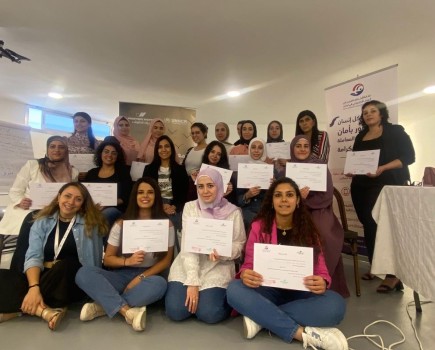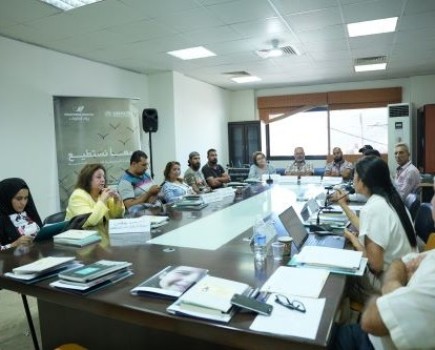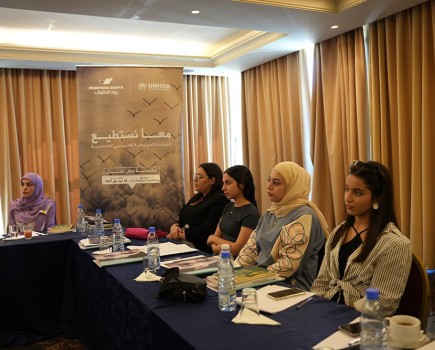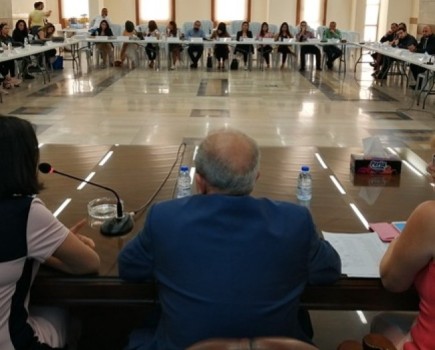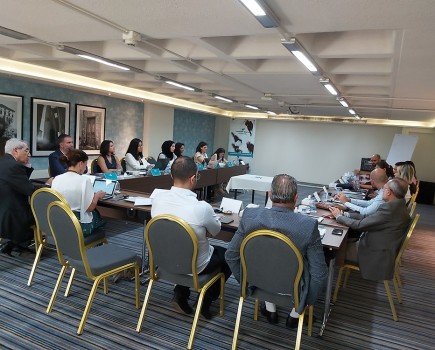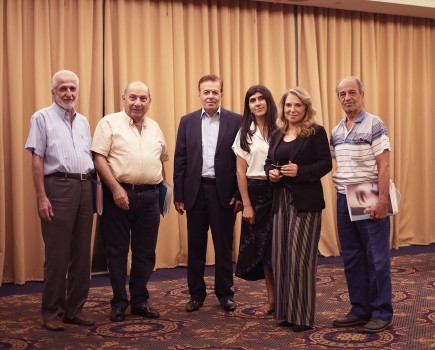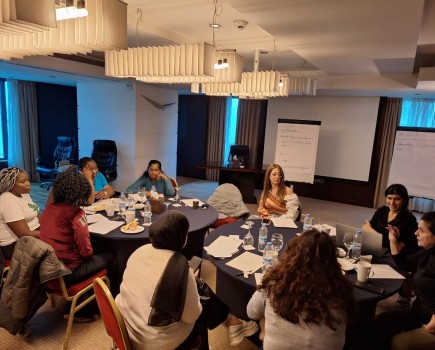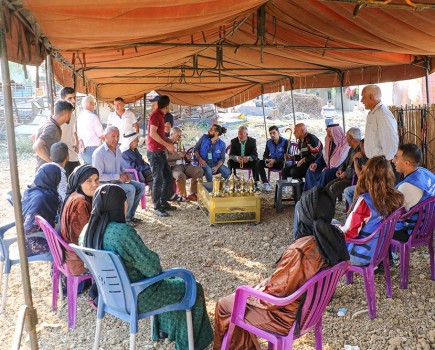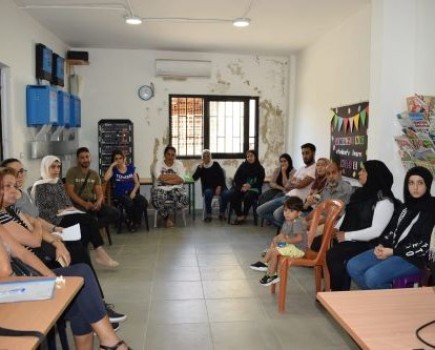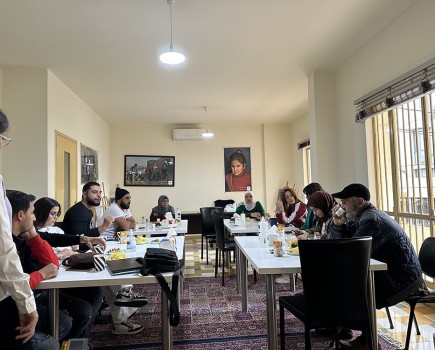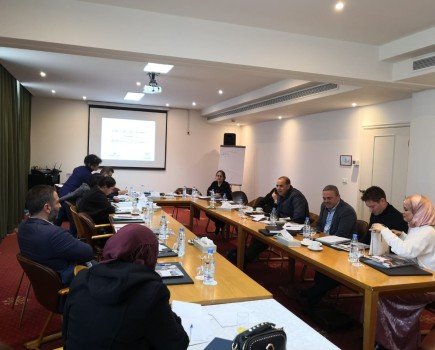Nour is a man but, at birth, has been mistakenly registered as a woman in official records! Can you believe that he has to vote alongside women, even today? Nour has become a victim of an error in civil registration.
Nour Abdullah
Despite being alive and in good health, Fatima is legally considered deceased. She didn't pass away naturally but was mistakenly recorded as deceased, resulting in her removal from official records. For years, she has been fighting to be formally acknowledged as alive by the state.
Fatima Abdulqader
Hayat was born without a nationality. She constantly blamed her family for her lack of papers, especially since all her siblings were able to obtain their nationalities, and she couldn't. Born in 1994 to a father who was naturalized in the same year, she was the victim of unclear legal procedures and missing legal provisions. With the assistance of Frontiers Rights, she was able to obtain her citizenship, complete her education, and graduate as a nurse.
Hayat Rbaji
Charbel faced challenges due to an outdated personal status registration system that is 70 years old! It still relies on manual processes and paper documents. As a result, his marriage registration, conducted abroad, was lost in bureaucratic processes between ministries and departments.
Charbel Khoury
Polygamy Unintended: A woman finds herself registered with two different husbands in separate regions due to a clerical error. Her divorce from her first husband wasn't officially recorded, and simultaneously, the clerk registered her second marriage without verifying her existing data. This error had many impacts since it not only affected her but also third parties and future generations.
Firas Allam
Mixing up records has big and negative consequences! It can even change a mother's identity! This happened in the Civil Status Extract of Imad and Amira’s daughter, where a stranger’s name was written instead of her mother’s. This was due to an employee's mistake during the manual transfer of information from paper records.
Imad Al Qawwas
Manually transferring the name or surname between the ID card and the registration statement can lead to a discrepancy in identity. This occurred with Imad, whose family name was incorrectly recorded on the Civil Status Extract as "Qawwas" instead of "Al Qawwas" as stated on his ID card. This mistake could have potentially prevented him from taking official exams but was luckily corrected in time.
Imad Al Qawwas
Obtaining Sami's birth certificate was a long process plagued by expensive errors. It has taken his father seven months and significant costs to correct the mistakes made by official clerks. This almost resulted in Sami's father missing the registration deadline for his son's certificate which could have made Sami stateless.
Mohammed Kleit
Mohammed's Sunni wife was mistakenly categorized as Shia on her Civil Status Extract. The clerk did not verify her information beforehand and automatically linked her to her husband. It appears that verifying records may appear to be a challenging task.
Mohammed Kleit 2
Meet Aya, the resilient Lebanese girl whose dreams were shattered due to the harsh reality of statelessness. In a world where legal documentation determines human worth, Aya found herself trapped in a circle of discrimination and limited opportunities.
Aya Al-Homsi
Hussein was born to a Lebanese mother but inherited statelessness from his father. His father spent his entire life trying to be officially recognized by the state. However, despite their efforts, both Hussein and his father remain excluded from state records, as individuals without nationality, leaving the state unaware of their existence.
Hussein Hamoud
Ahmad is a Lebanese citizen, but his children are not. Their mother is a foreigner living irregularly in the country. Ahmad's financial constraints made it impossible to regularize her residency status, which has become increasingly difficult over time. As a result, Ahmad was unable to register his marriage or children. Now, he faces the challenge of legalizing his wife's residency status, pursuing a lawsuit, and undergoing DNA testing to register his children.
Ahmad
Ayman is a victim of the individual initiative in birth registration. Born to an unknown father and a Lebanese mother who left him as a baby, he remains unaware of her whereabouts. Because registration of children requires parental action, Ayman remains unregistered to this day.
Ayman
Ola is also a victim of the individual initiative in birth registration. Born to Lebanese parents, she is the youngest in a family where all her siblings are registered. However, after her birth, the family's house caught fire. Her mother suffered severe burns and amidst the chaos, the family forgot to register Ola, who remains unregistered to this day.
Ola
Dalal is another victim of the individual initiative in birth registration. Born with a serious illness and deemed unlikely to survive by doctors, her father chose not to register her at birth. Now, nearing 50 years of age, Dalal's brother has had to take legal action to register her, allowing her to access a disability card and the associated rights
Dalal
Ahmad was born into a Lebanese family, but his grandfather failed to register his only son, Ahmad's father. When Ahmad and his siblings attempted to register under their Lebanese grandfather's record, they were required to undergo a DNA test with a direct paternal relative to verify their Lebanese lineage. However, both their father and grandfather had no living direct relatives. Consequently, they must conduct the test using their grandfather's remains, the location of which is unknown.
Ahmad Hassan
Re-registering under her family's name proved to be a challenging journey for a woman represented by Mr. Allam. The process involved multiple rounds of paperwork and visits to registry offices, particularly when errors occurred. Despite getting divorced, she still faces obstacles in rectifying her records and reclaiming her freedom.
Firas Allam
Ahmad is one of the unlucky ones. The paper registry containing the birth documents for all births in the year he was born was destroyed, and the civil registry went missing. He only became aware of his lack of records when he got married, had children, and sought to register them. Without a record, he had to go through the process of reclaiming it, which demanded time and effort. Eventually, he had to file a lawsuit to secure records for his children.
Ahmad Ali
Layal's case is representative of most cases of unregistered Lebanese individuals. Layal bears the consequences of her family's actions who failed to register her at birth. Today, Layal and her children face significant losses because of their neglect, and her children are also stateless. They are all experiencing a life marked by a mistake they did not commit.
Layal
When Rama talks, she speaks for all unregistered Lebanese children: "Why am I different? Even though both my mother and my father are Lebanese, I am still denied recognition!"
It is difficult for her to comprehend that the law can be complex and unjust, leaving her as a victim of its shortcomings.
Rama Al-Ali
Remy tragically lost her child, thinking it was due to an illness. It was later revealed, however, that her child was lost to child trafficking, as she lacked any documentation to prove her maternity. Despite her profound motherly love, it was insufficient to establish her connection to her son without a birth certificate or any other supporting documentation.
Remy
Despite her mother being alive, Sara finds herself orphaned. Her father died a while ago and her mother, who lived irregularly in Lebanon, was subsequently deported to Egypt. Due to their circumstances, Sara's parents were unable to register their marriage or Sara's birth. Consequently, Sara was left without family and without any official registration.
Sara Al-Tahsh
Walid falls under the "Qayd Dars" Citizenship category. He is unsure of what this entails and struggles to understand why his daughters have inherited this citizenship as well, and all its associated challenges. Walid and his descendants are without citizenship to this day. He is a father whose dreams for his daughters are shattered and fears the day they will ask him about their citizenship.
Walid
Kolthoum, like all mothers, wants the best for her children. She wants them to live as free Lebanese citizens. However, she now accepts that acquiring nationality through other means may be necessary, particularly as obtaining it through their father's naturalization has proven impossible. Despite all her efforts and struggles, Kolthoum bears the pain of years that have been engraved on her face. She takes her children's documents from one department to another and from one court to another. Her ultimate goal is for her children to live with dignity in a country that has denied them citizenship, along with many other things.
Kolthoum
Israa has five sisters, but overnight, she gained a sixth one! She was mistakenly added to her family's registry through a clerical mistake. The sister was transferred to Israa's family registry for a month before being erroneously recorded as deceased and removed. Israa is left baffled, with no explanation for how such a mistake could occur.
Israa
Iman remains unregistered to this day because the intermediary responsible for her registration lost her original birth documents. She would have been willing to be registered as a refugee just to have some form of registration. However, losing her right to registration due to the loss of her documents is an injustice imposed upon her, and she continues to suffer the consequences to this day.
Iman
Hussein and his family are currently suffering from a personal dispute that dates back over 100 years. Despite being born to a grandfather residing in Lebanon during the 1932 census, he was not registered because the village Mukhtar chose not to declare him due to a personal disagreement. Today, another dispute appears to impede the progress of their nationality lawsuit.
Hussein Muhanna
Rama was born to a Lebanese mother and an unregistered father. In Lebanon, women do not have their own records; instead, they are transferred from their father's registration to their husband's upon marriage. When Rama's mother attempted to register her marriage, she found herself still listed under her father's registration but as a married woman. This doesn't mean she now possesses her registration, but simply that there is no registration for her husband to transfer to.
Rama Al-Ali
Sally is a victim deprived of registration due to "Tobyid Wej." The mukhtar, appointed by her father to register her sister, neglected to do so within the deadline. He seized a convenient opportunity to rectify his oversight by registering Sally's sister using Sally's birth documents, thus leaving Sally without any registration.
Sally Al-Qadi
Fadl acknowledges that necessity is indeed the mother of invention. He faced difficulties in registering his marriage due to recurring errors that required multiple corrections. When he attempted to register his children, he realized the significance of electricity. Power outages at official departments caused delays in processing the registration, prompting him and the employee to devise a new method to complete the process.
Fadl
Imagine that to register your birth, you have to prove the death of a third party who is neither a relative nor a family member. Youssef and his siblings had to prove the death of the legal midwife who oversaw their birth because they couldn't present birth certificates officially recognized today. The reason: Youssef's family did not obtain birth notifications immediately upon birth.
Youssef Isa
Jameel was on the verge of despair until he encountered a group of young volunteers actively working with FRH who revitalized his spirit. Despite lacking registration and fighting for his nationality, he resolved not to fight solely for himself but to include all those without registration in his struggle.
Jameel
Mustafa is from the village of Mashari' Al-Qaa, which is home to many unregistered individuals. Unfortunately, Mustafa and others in the community face bullying and discrimination because of their lack of nationality. This underscores the significance of fostering societal solidarity with stateless individuals and integrating them into society.
Mustafa
Manna', who is stateless by descent, has been striving for nationality for himself and his children for years. Despite encountering numerous difficulties and obstacles along the way, he remains steadfast in his pursuit of this right, refusing to relent and continuing to advocate for it.
Manna’
Rima found herself in a bewildering situation—she was listed as deceased in official records when she attempted to exercise her right to participate in political life. The complications didn't stop there; she also discovered that her name was missing from her family's record page due to damage at the top. Additionally, Rima and all her siblings were inexplicably removed from her father's family registry!
Rima Karnabi
The individuals featured in this video have nothing in common except for the fact that each of them experiences suffering in their own unique way as a result of Lebanon's personal status registration system.
Testimonials
